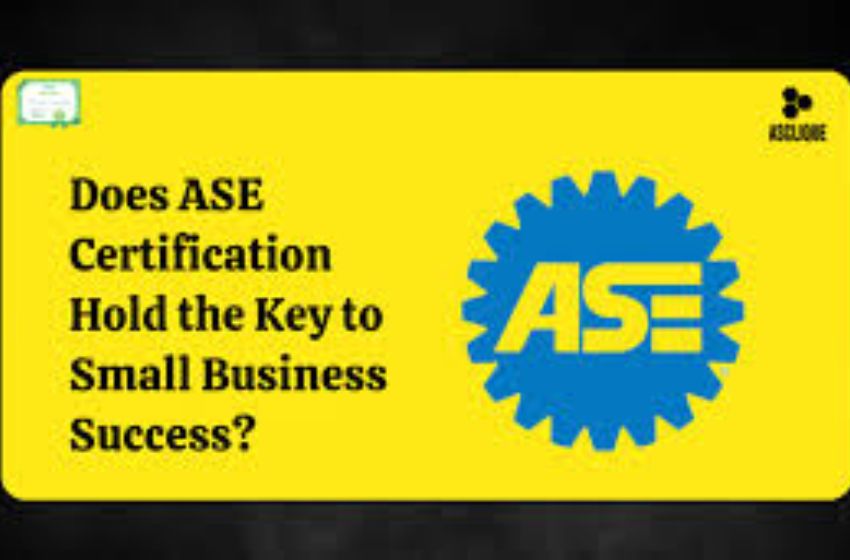In the competitive world of automotive repair, small businesses often face unique challenges. Standing out among larger competitors while building trust with customers is key. A question that frequently arises for small auto repair shops is: does ASE certification matter for a small business? This article, brought to you by Wisto Journal, explores the significance of ASE (Automotive Service Excellence) certification, its impact on small businesses, and whether it’s worth the investment.
What Is ASE Certification?
ASE certification is a credential awarded by the National Institute for Automotive Service Excellence. It recognizes individuals who have demonstrated expertise in automotive repair and service. To become ASE certified, technicians must pass rigorous exams and have relevant hands-on experience. Certification is available for various specialties, such as engine repair, brakes, and electrical systems.
For a small business, the ASE certification can be an indicator of professionalism and expertise. But the question remains: does ASE certification matter for a small business?
Building Customer Trust Through ASE Certification
For small businesses, trust is a vital component of success. Customers often seek assurance that their vehicle is in capable hands, especially when it comes to complex automotive repairs. ASE certification provides this assurance.
- Enhanced Credibility: Displaying ASE certifications shows potential customers that your business employs skilled and knowledgeable technicians.
- Competitive Edge: In areas where there are multiple small repair shops, having ASE-certified staff can differentiate your business from competitors.
- Customer Retention: Trust leads to repeat business. When customers see your shop’s commitment to excellence, they’re more likely to return and recommend your services.
By investing in ASE certification, small businesses can position themselves as reliable and professional establishments.
Does ASE Certification Justify the Cost for Small Businesses?
One common concern for small business owners is the cost of ASE certification. While there are fees for exams and potential training, these costs should be seen as an investment.
- Return on Investment (ROI): ASE certification can lead to higher customer satisfaction, more referrals, and potentially higher service rates.
- Long-Term Gains: Though the initial expense may feel significant, the trust and credibility built through certification can result in steady business growth.
- Employee Motivation: Encouraging your team to obtain ASE certification demonstrates that you value their expertise and career development, leading to improved job satisfaction and productivity.
Despite the costs, many small business owners find that the benefits of ASE certification outweigh the investment.
How ASE Certification Impacts Business Operations
ASE certification is not just a marketing tool; it can also improve daily business operations.
- Quality Repairs: Certified technicians are trained to diagnose and fix issues accurately, reducing the likelihood of customer complaints.
- Efficiency: With the right skills and knowledge, certified technicians can complete repairs faster, allowing your business to handle more jobs.
- Reduced Liability: Properly trained staff are less likely to make costly mistakes, protecting your business from potential legal issues.
For small businesses looking to streamline operations, ASE certification can be a valuable resource.
Does ASE Certification Matter for Marketing and Branding?
Marketing is essential for small businesses, and ASE certification can play a crucial role in branding.
- Professional Image: Featuring the ASE logo in your shop and promotional materials signals to customers that your business meets industry standards.
- Customer Perception: Consumers often associate certifications with quality and reliability. ASE certification can enhance your business’s reputation in the local community.
- Word-of-Mouth Marketing: Satisfied customers are more likely to recommend your shop to friends and family, especially when they know your technicians are certified professionals.
Incorporating ASE certification into your marketing strategy can help establish your business as a trusted name in automotive repair.
Challenges of Pursuing ASE Certification for Small Businesses
While the benefits are clear, pursuing ASE certification can present challenges for small businesses.
- Financial Constraints: The cost of certification, especially for multiple employees, can strain a small business’s budget.
- Time Commitment: Preparing for ASE exams requires significant time and effort, which may be challenging for technicians balancing busy schedules.
- Employee Retention: Investing in certification for employees comes with the risk of them leaving for other opportunities.
However, these challenges can be mitigated by carefully planning certification initiatives and setting clear expectations with your team.
Alternatives to ASE Certification
If you’re still unsure whether ASE certification is right for your small business, consider alternative ways to build credibility and trust.
- Customer Reviews: Encourage satisfied customers to leave positive online reviews.
- Local Partnerships: Partner with local organizations to establish your presence in the community.
- Ongoing Training: While not as formal as ASE certification, regular training sessions can enhance your team’s skills and expertise.
These alternatives may not carry the same weight as ASE certification, but they can still contribute to your business’s success.
Does ASE Certification Matter for a Small Business? The Final Verdict
In conclusion, does ASE certification matter for a small business? The answer depends on your business goals and resources. For many small automotive repair shops, ASE certification is a valuable asset that enhances credibility, improves operations, and attracts loyal customers. However, it’s important to weigh the costs and benefits carefully to determine if it aligns with your specific needs.
At Wisto Journal, we believe that making strategic investments in your business, like ASE certification, can pave the way for long-term growth and success. Whether you choose to pursue certification or explore other avenues, the key is to stay committed to delivering high-quality service and building strong customer relationships.



